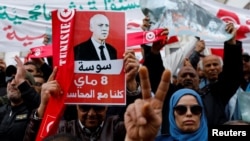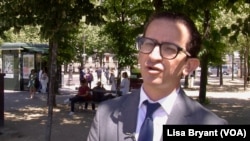Tunisian opposition lawmakers are in Paris to lobby against a controversial constitutional referendum taking place later this month, which they argue risks plunging the fragile Arab Spring democracy back into dictatorship.
For years, Tunisia’s bickering parties delivered gridlock in parliament and mounting public anger. So today, it’s strange to see onetime political foes here in Paris, united against one man — Tunisian President Kais Saied — and his new draft constitution.
“The international community hasn’t to recognize the Saied process in Tunisia because it’s not a legitimate process…," said Makhloufi.
Sofiane Makhloufi is a member of parliament from Tunisia’s Tayyar party — which once supported Kais Saied. That was before Tunisia’s president dismissed his government, suspended parliament and seized wide-ranging powers in July 2021.
Now, President Saied wants Tunisians to vote on a new draft constitution in a July 25 referendum. The United States and European Union have called for an inclusive democratic process—one, critics say, that guided Tunisia’s last 2014 constitution, but not this one. Even the legal expert behind the new charter has disavowed it, saying it’s not what his committee originally drafted.
“He didn’t respect the (2014) constitution (but) he has been elected by the constitution. I think everybody in the world, and Tunisians, must not recognize the legitimacy Saied is (trying to get) for himself," said Makhloufi.
Makhloufi’s Tayyar and multiple opposition parties are now calling on Tunisians to boycott the referendum. The parties include the Islamist-inspired Ennahdha party that retains fading but still sizable popular support.
Ridha Driss is senior advisor to Ennahdha’s leader Rached Ghannouchi. He warns President Saied is bent on one-man rule and will ensure the constitution is passed, one way or another.
Also, part of the alliance is Ennahdha’s once-staunch enemy, the Qalb Tounes, or “Heart of Tunisia” party. Lawmaker Oussama Khlifi says his party is calling for national unity, as the only way to save Tunisia.
The tiny, North African country has faced a rocky ride toward democracy since its 2011 revolution that kicked off the wider Arab Spring revolt. Tunisia's economy has stumbled, and politics have been marred by paralysis and corruption.
Many Tunisians hailed Saied’s unlikely presidential win in 2019. They cheered when the former law professor seized wide-ranging powers last year. But today, public support is fading and disenchantment growing as the country battles a mounting economic crisis. Experts predict low voter turnout for this upcoming referendum.
For his part, President Saied denies authoritarian goals and says he’s committed to political freedoms. He sees this new draft constitution, which among other things, strengthens presidential powers and waters down legislative ones, as correcting a dysfunctional system.
If the constitution is passed, the opposition fears more unrest and troubled times for Tunisia in the weeks and months ahead.






